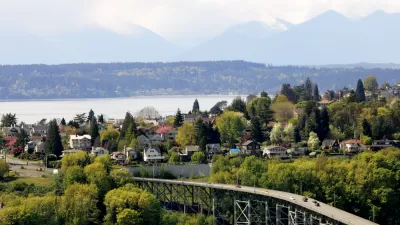Vancouver is considering eliminating a rezoning application, which could save non-profit developers up to two years in the city's approvals process.

Nonprofit housing in Vancouver's low-rise neighborhoods may soon have the ability to skip a rezoning application, expediting construction in an effort to alleviate the city's affordability issues. According to Kenneth Chan, "it would allow new non-profit social and co-housing up to six storeys in large areas of Kitsilano, Fairview, and Mount Pleasant, as well as the western and northern areas of Grandview-Woodland, and Marpole south of 70th Avenue." Applicants in the designated areas would skip the rezoning application and public hearings normally required for bigger developments, shaving an estimated two years from the application process.
"It is anticipated this will help address the shortage for below-market housing, allowing non-profit societies and co-ops to renew existing buildings and expand over time. The direction towards six-storey wood frame construction is the highest possible form without concrete construction, and it is financially feasible on existing non-profit owned sites with funding from senior governments." The proposal has to pass through the city council and public hearings. A survey conducted last fall indicates that Vancouver residents overwhelmingly support streamlining the process for building non-profit housing and allowing greater building height for these developments. The move could help the city achieve the social housing goals set out in its Housing Vancouver plan, where it has been falling short of its annual targets.
FULL STORY: City of Vancouver considering expediting non-profit housing by eliminating rezoning step

Alabama: Trump Terminates Settlements for Black Communities Harmed By Raw Sewage
Trump deemed the landmark civil rights agreement “illegal DEI and environmental justice policy.”

Planetizen Federal Action Tracker
A weekly monitor of how Trump’s orders and actions are impacting planners and planning in America.

Why Should We Subsidize Public Transportation?
Many public transit agencies face financial stress due to rising costs, declining fare revenue, and declining subsidies. Transit advocates must provide a strong business case for increasing public transit funding.

Understanding Road Diets
An explainer from Momentum highlights the advantages of reducing vehicle lanes in favor of more bike, transit, and pedestrian infrastructure.

New California Law Regulates Warehouse Pollution
A new law tightens building and emissions regulations for large distribution warehouses to mitigate air pollution and traffic in surrounding communities.

Phoenix Announces Opening Date for Light Rail Extension
The South Central extension will connect South Phoenix to downtown and other major hubs starting on June 7.
Urban Design for Planners 1: Software Tools
This six-course series explores essential urban design concepts using open source software and equips planners with the tools they need to participate fully in the urban design process.
Planning for Universal Design
Learn the tools for implementing Universal Design in planning regulations.
Caltrans
Smith Gee Studio
Institute for Housing and Urban Development Studies (IHS)
City of Grandview
Harvard GSD Executive Education
Toledo-Lucas County Plan Commissions
Salt Lake City
NYU Wagner Graduate School of Public Service





























